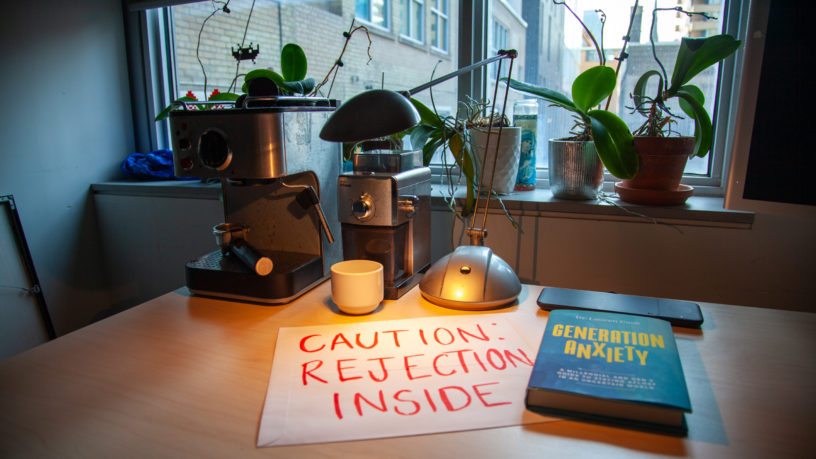By Mariyah Salhia
My name is Mariyah and I’m a recovering overachiever.
When I was in the sixth grade, I started to learn to play the piano. During my first 30 minute lesson, I played my way through about three quarters of the sheet music in the introductory book. My teacher told me that usually her students would only get through one or two pages on their first lesson.
When I think back to being in the second grade, I remember handing in my poetry homework a week in advance, I’d raise my hand to answer every question in my French class, I’d volunteer to have my assignments read to the class.
I’ve never really thought I was particularly smart or a particularly diligent student or a piano maestro.
But I always thought everything I tried to do was easy.
As a kid, my parents spent hours trying to convince me that one day things wouldn’t be easy. That one day I wouldn’t be able to turn in assignments I’d done the night before or I wouldn’t be able to make the honour roll by studying for tests just hours before I was supposed to write them. And yes, I’d nod my head in agreement. “I know,” I’d say to my parents, “I understand.”
And I thought I did understand. But it turns out I didn’t.
“It was the first time I really, really wanted to work hard, the first time I felt like I had something to lose”
By the time the 12th grade rolled around, all my friends were talking about university applications and I couldn’t really be bothered. For a few months, I thought I might take a gap year. University didn’t sound appealing and I couldn’t understand why.
My friends were excited to get out of high school, so was my twin sister. My parents gave me advice about what kinds of programs sounded like a good fit for me, my sister would show me brochures for the programs she and her friends were starting applications for.
However, I wasn’t so excited.
After a conversation with my guidance counselor, I was told that maybe post-secondary education wasn’t the best option for me. That one sentence was like a punch to the gut.
My guidance counselor Mr. Parker, was confused at my upset.
“I thought you’d be relieved,” he said. “You don’t really seem interested in going to university.”
Until that moment, I felt like my indifference to school was completely internal. It was the first time that anyone other than my parents told me that I wouldn’t get into university if I didn’t care about getting accepted at all. I wouldn’t be able to get into any program, let alone the one I preferred. “Post-secondary isn’t for everyone, Mariyah,” he said.
Why wasn’t it for me? It was for my friends and my sister. It was for my parents. Did my teachers think I was a bad student? Sure, my 11th grade functions teacher might’ve told my parents she suspected I was dyslexic but everyone has a little bit of trouble with math, right?
After that meeting, and frankly, the white hot shame of knowing that someone could see through my “I love school” facade, what became most important to me was making sure I got into university and proving Mr. Parker wrong. That was my first mistake.
It was around this time I think my mom was starting to get a read on the fact that maybe I wasn’t really feeling so good about going to university right after graduating high school. Mainly because my plan for university was to hit copy and paste on my mom’s plan for university: major in criminology, minor is sociology. Another mistake marking my second one.
My mom was everything I wanted to be. She was successful, she had a job she really liked and she got to wear a nice outfit to work everyday. When I went into her office with her, her coworkers would tell me how amazing she was while I stared at her degrees hung up on the wall behind her desk with my feet dangling off the edge of her deep client chairs. My mom, in her all knowingness, believed there were other ways for me to be like her without doing her degree program, which she had a feeling already knew I’d hate.
“I thought I did understand but it turns out I didn’t”
It took a lot of convincing to finally get to the point where I knew my parents wouldn’t think less of me for going to Toronto Metropolitan University (TMU) instead of their alma mater, the University of Toronto (U of T). My sister was set on going to McMaster University, but, when it was time to work on my journalism school application, everyone was on team Mariyah.
My mom proofread my personal essay, my dad filmed me doing streeters at Yonge-Dundas Square and my sister would give me pep talks when I thought my chances of getting in were slim to none. I’d never wanted anything as badly as I wanted to be admitted to this program, this newfound desire had lit a fire in me.
It was the first time I really, really wanted to work hard. The first time I felt like I had something to lose. But up until that point, I’d never faced any real rejection, and I had no reason to believe I was going to start now. If I succeeded when I didn’t try, I could only imagine what would happen if I tried my hardest.
I was pretty bummed out when I was rejected from the program.
After emailing back and forth with an admissions officer, re-taking my 12th grade English class the summer after I graduated high school, writing a letter of reconsideration and FedEx-ing a copy of my updated transcript to the TMU admissions office, I was still waitlisted for about a month. That August, right before school was supposed to start, I got a phone call that I’d gotten in.
I spent that point onwards extremely paranoid about under performing, even when I was at my best. Staying on campus late to finish all my assignments, taking advantage of as many office hours meetings as possible.
Still, after my first semester, I ended up on academic probation.
Yeah, there was a lot going on for me, it was the first time I was living away from home, none of my friends were at the same school as me. Also, I was in my first ever relationship with a partner whose idea of a romantic date was playing video games with his roommates.
It didn’t matter to me. For the second time since deciding I wanted to be in this program, I’d failed. When my second semester started, I was ready to be the picture of academic perseverance.
Just a few weeks into the semester, COVID-19 shut down my in-person classes. In just a matter of days, I’d gone from being independent and finding my workflow to trying to figure out how to be a student in the confines of my computer screen, while my sister was watching her lecture a mere four feet away from me.
I did everything I could. I made sure I worked at my desk and not in my bed. I scheduled calls with my professors when I needed extra support, I started pitching stories to publications to try and get my name out into the industry. I pursued stories in class that were important to me.
I’d worked as hard as I could and still at the end of my third year, my academic advisor told me I’d likely need to take a fifth year.
“An overachiever’s recovery is a painful one and I’m still figuring out how to do that”
And there it was, my third failure. All the work I’d done to prove to myself that I wasn’t a failure had gone down the toilet in one swift flush by my academic advisor, who was as delicate as he possibly could’ve been.
So here I am, in my fifth year of my undergraduate degree. It’s taken a long time for me to feel like being in my fifth year was alright. Unlike other people I knew, I wasn’t doing this by choice, I was doing this as a consequence.
My mom had taken every opportunity to make sure I knew that taking an extra year was normal. Who cares how long it takes to finish this degree? Nobody was going to care if I took an extra year on undergrad and now I’d have the opportunity to bolster my GPA for master’s applications.
Now, I’m trying to figure out how to navigate my new normal. Maybe I wasn’t meant to be the person who breezed through classes and sheets of piano music. Maybe it’s time for me to accept what I was meant to do is trip and fall to figure out how to get back up.
An overachiever’s recovery is a painful one and I’m still figuring out how to do that. The journey to that is by adjusting to a new reality, one where I’m happy with what I achieve when I try my best and not wallow in self pity when I couldn’t over achieve.












Leave a Reply